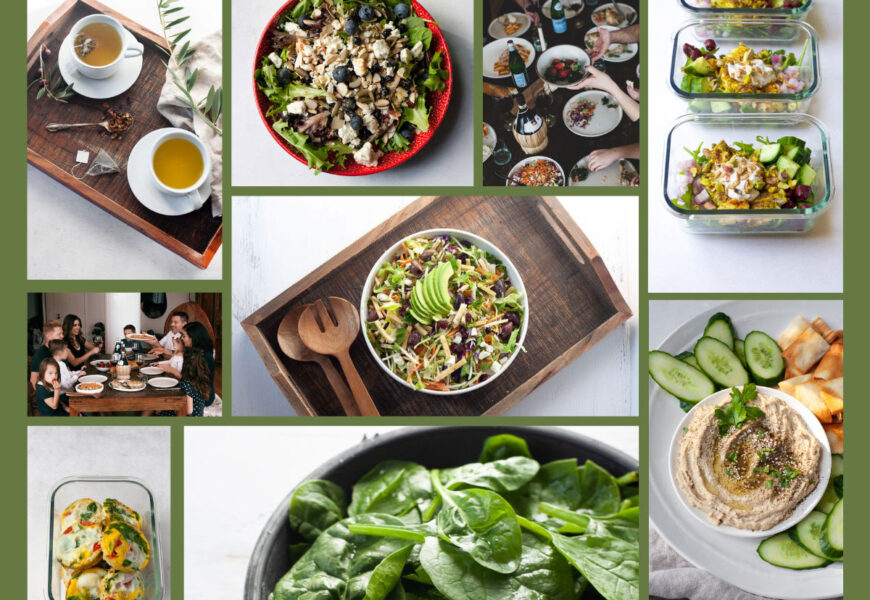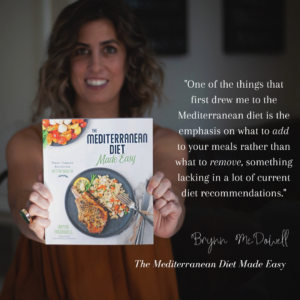Not sure where to begin? We are here to help with 11 tips for Starting a Mediterranean diet to set you up for lifelong health and happiness.
Where to Start with the Mediterranean diet
If you are just staring out trying to adopt a more Mediterranean diet inspired lifestyle, it can be a little overwhelming.
Many of us are so used to a “diet” that tells us what to eat, when to eat, what not to eat, etc. There is typically a list of forbidden foods to eliminate and that’s where most people start.
The Mediterranean Diet & Lifestyle is unlike traditional “fad diets”. There really aren’t foods that are forbidden. Instead, this healthy lifestyle focuses on foods you should add to your meals. The Mediterranean diet also focuses on creating joy around eating and sharing meals with others. Refreshing right?
However, that lack of rules that often leave people questioning how exactly to start. That’s where we aim to help.
We previously shared this helpful article: How to Start a Mediterranean Diet. This feature includes more detailed swaps you can take in your own home to adopt this healthy lifestyle.
Creating a Healthier Lifestyle, One Step at a Time
The key with any lifestyle change to is make small, gradual changes. Trying to change everything, all at once is a recipe for disaster.
The starting point for each person will be different as well. I encourage you to take a look at your lifestyle and pinpoint the areas where you think you need the most changes. Some questions to ask yourself might include –
- how is your fruit and vegetable intake?
- do you consume a lot of sugary beverages?
- are your meals filled with store bought items that contain a lot of preservatives or added ingredient?
- how much time do you have to prepare meals?
- are your dinners mainly red meat focused?
- is fish a part of your weekly meal plan?
- do you find yourself hungry in the afternoon and reaching for a quick snack?
- do you use a lot of butter to flavor your dishes?
Narrowing down one or two areas that you would like to improve first is a great place to start.
Simple Tips for Starting a Mediterranean Diet
The following are a few tips for anyone looking to start a Mediterranean diet. Please note that everyone’s lifestyle is different, so your goals will be specific to yourself.
The Mediterranean diet in considered a plant based diet, which means that the majority of meals are made up of –
- fruits and vegetbles
- whole grains
- nuts and seeds
- bean and legumes
- olive oil
#1 Veggies, Veggies, Veggies
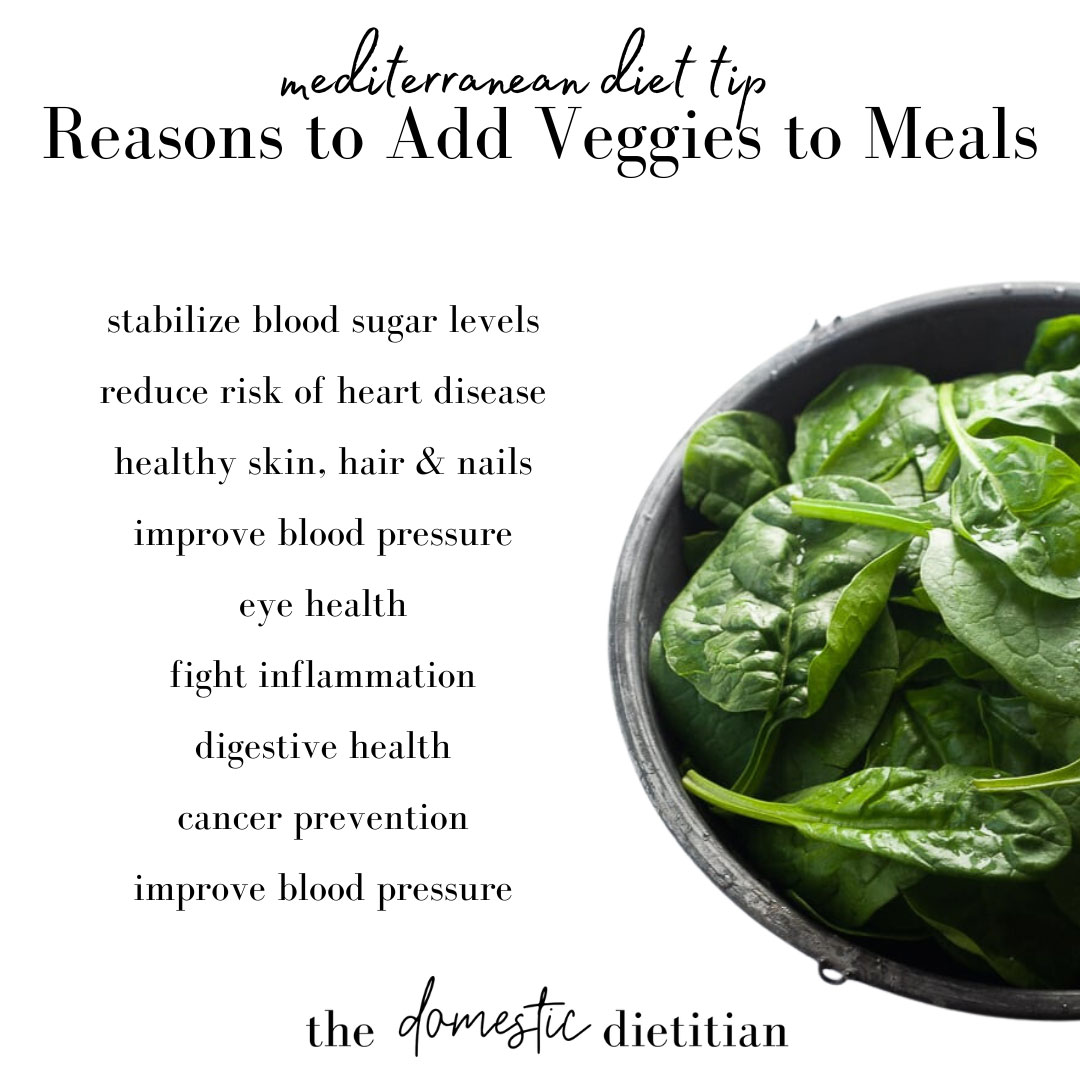
Whenever someone asks for our advice on starting a mediterranean style diet, we always say your first goal should be eating more vegetables.
Including a wide array of different colored vegetables in your meals not only provides fiber but an array of vitamins, minerals and antioxidants.
Adding spinach to smoothies, sautéed bell peppers to scrambled eggs, cucumber and sprouts to sandwiches, etc are all good examples of ways to add more veggies into meals. You can find even more tips here – National Fruits and Veggies Month
#2 Olive Oil instead of Butter
Olive oil is a huge part of the Mediterranean diet and is used as the oil of choice in most dishes.
Olive oil is rich in monounsaturated oleic acid. This fatty
acid is believed to have many beneficial effects, including reducing inflammation and helping prevent certain types of cancers.
When used in place of butter, you are reducing the amount of saturated fat in your diet. Saturated fat intake has been linked to increased cholesterol, which can increase your risk for stroke or heart disease.
#3 Reduce Red Meat Intake
One of the guidelines of the Mediterranean diet includes limiting red meat intake to an “occasional” part of your diet. Red meat is typically higher in saturated fat than other protein choices. Reducing red meat intake can help lower saturated fat intake thereby reducing cholesterol and risk for heart disease and stroke.
Please note that “reducing” red meat intake doesn’t mean eliminating it from your diet. It simply means cutting back and enjoying it occasionally. “Cutting back” will mean different things for everyone. For some it could mean enjoying red meat once a week instead of multiple nights. For others, is could mean just enjoying a steak a few times a month. Do what works for you.
#4 Spices and Herbs for Flavor
One of my favorite things about the Mediterranean diet is that is usually fairly simple ingredients but the dishes are so flavorful. This is mainly due to the generous use of herbs and spices for flavor.
Using fresh herbs, lemon, garlic and dried spices to season dishes often means you are using less salt, cream based sauces or butter based dressings.
This Dill Yogurt Dressing is a great example of using herbs, garlic and lemon for flavor.
#5 Add Beans and Lentils to Meals
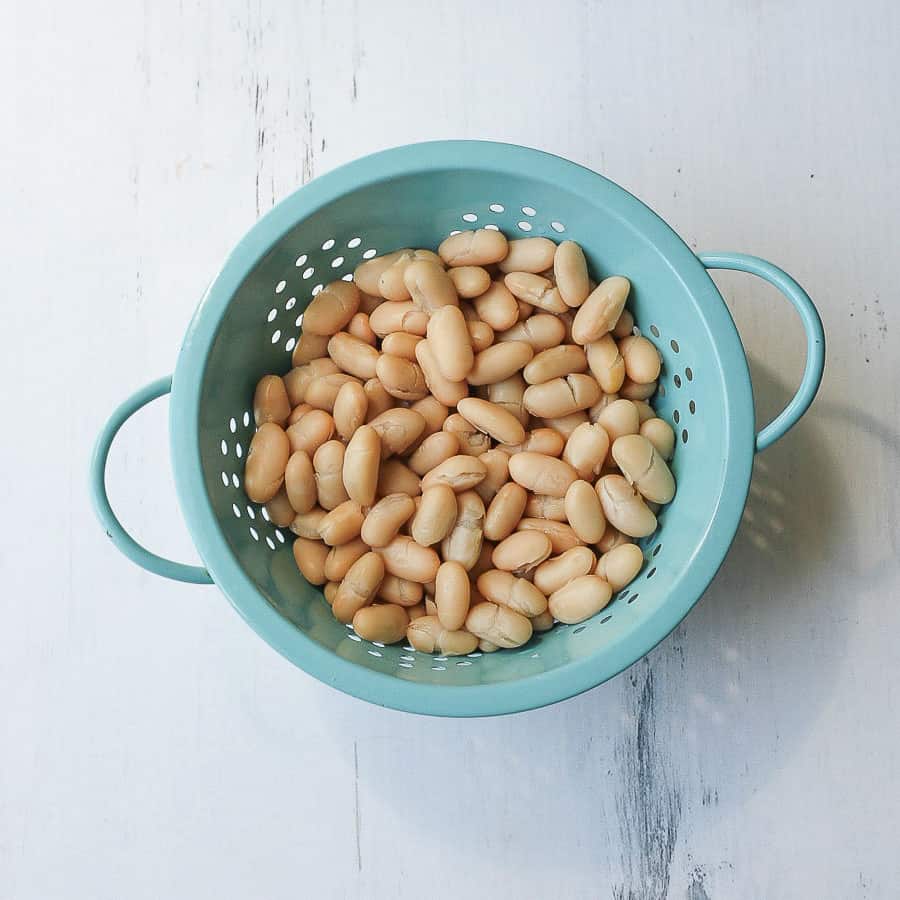
Beans and lentils are an inexpensive addition to meals, especially if trying to cut back on meat. They are fast, convenient, low in calories, high in fiber, and a good source of protein.
Adding beans and lentils to meals can –
- Decrease in cholesterol levels due to the high fiber content
- Low Glycemic Index and high fiber content can help regulate blood sugar levels for those with diabetes
- Good source of folate, which is important for women who are pregnant or thinking of trying to become pregnant
- Good source of iron
- Source of potassium, which can help with blood pressure and heart health
Check out this great collection of 25 Recipes Using Beans & Lentils
#6 Reduce Added Sugars
Added sugars are another one of the ingredients that should be enjoyed occasionally when following a Mediterranean diet. Consuming excess added sugars can lead to weight gain, inflammation, blood sugar problems, as well as damaging blood vessels and increased risk for diabetes and certain forms of cancers.
Please note that we aren’t talking about the sugars that can naturally be found in foods like fruit, dairy and certain vegetables.
We are mainly concerned and focused on the added sugars in foods like store bought cookies, pastries, sweetened beverages, candy, and even condiments/dressing/sauces.
According to the 2020-2025 Dietary Guidelines for Americans, the top sources of added sugars include –
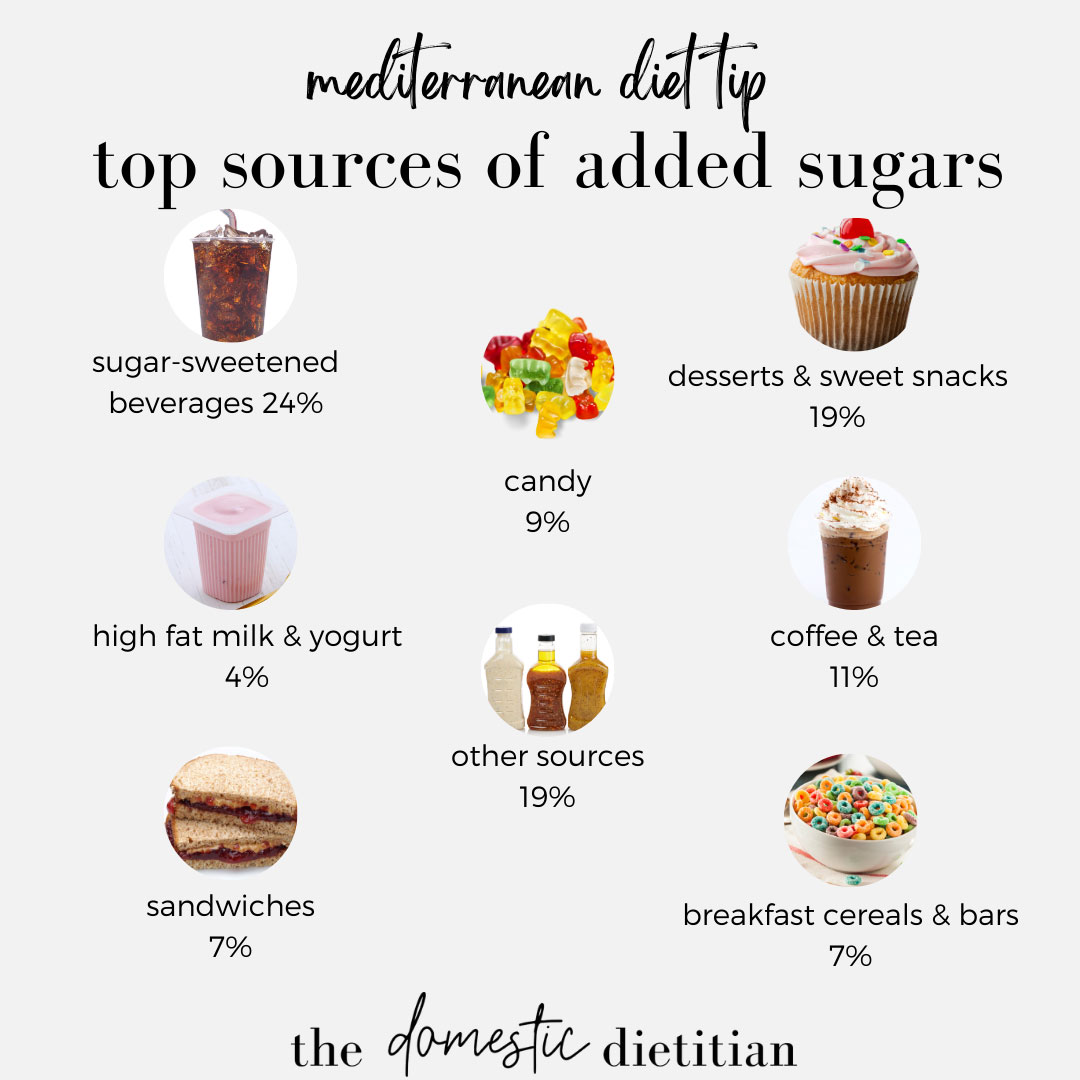
The average American consumes 270 calories/day from added sugars.
Some ways to reduce added sugars include –
- limiting sugar sweetened beverages like soda, less than 100% fruit juice, sweet tea, sugary coffee and tea drinks, sports drinks, etc
- Incorporate more fresh fruit into meals for natural sugars in place of candy, chocolate, cookies, cakes, pies, etc
- Try making homemade desserts to control added sugars and enjoy occasionally instead of an everyday occurance
- Read ingredient labels to look for store bought products without added sugars, especially when it comes to salad dressing, spaghetti sauces, ketchup, dips, and marinades
#7 Homemade vs Store Bought
The Mediterranean diet places focus on enjoying the act of cooking and sharing meals with others and I find it so refreshing. Don’t get me wrong, the modern conveniences of packaged meals and take out is lifesaving. However, there are so many preservatives, thickening agents, additives and excess sugars added to these types of convenience foods.
One goal if you are trying to adopt a more Mediterranean diet lifestyle is to try making more meals at home. This could be as simple as picking a dressing you enjoy at the store and trying to find a recipe to make it yourself at home. Or for some it could mean less takeout and more dinners made at home.
Playing around in the kitchen is a great way to learn what flavors you enjoy, new spice combinations or simple ways to cut back on added sugars, fats or sodium.
Some goals for this could be –
- making homemade hummus in place of store bought
- pulling together an olive oil based vinaigrette instead of store bought dressing for the week
- spending some time meal prepping on Sunday for easy to grab meals
- finding new recipes to try creating at home
- bringing lunch from home twice a week rather than eating out
#8 Including Nuts & Seeds
You’ll find nuts and seeds in many different Mediterranean diet style dishes. Not only do they add flavor and texture but pack a nutritional punch as well. Nuts and seeds contain a good amount of protein, healthy fats and fiber. Certain types also contain various vitamins and minerals that can help with blood pressure, hair and skin health, immunity, antioxidants and inflammation.
Ways to add nuts and seeds into meals –
- sprinkle nuts or seeds on salads
- add sliced almonds or pumpkin seeds to yogurt and fruit
- create an afternoon snack of 1oz of nuts and a piece of fresh fruit
- add chopped peanuts or sliced almonds to stir fry or fried rice for added texture and flavor
#9 Fish, Poultry, Eggs and Dairy for Protein
While reducing saturated fat can limit red meat intake, the Mediterranean diet focusing on including fish, poultry, egg and dairy for sources of protein.
In addition to protein, fish can also be an excellent source of Omega 3 Fatty Acids, which are essential fatty acids not produced in the body, so we have to get them from food.
Research has shown that Omega 3 fatty acids have the ability to –
- Promote healthy brain and eye development in children
- Help build muscle and tissue
- Reduce the possible risk of heart disease
Check out more on the Health Benefits of Seafood or find inspiration here – 55 Healthy Fish Recipes.
#10 Snack Smarter
Did you know there is a formula when it comes to snacking? Creating a balanced snack helps ensure you are feel full until your next meal and stabilizes blood sugar levels.
The formula for a balanced snack = Fiber + Protein + Healthy Fat
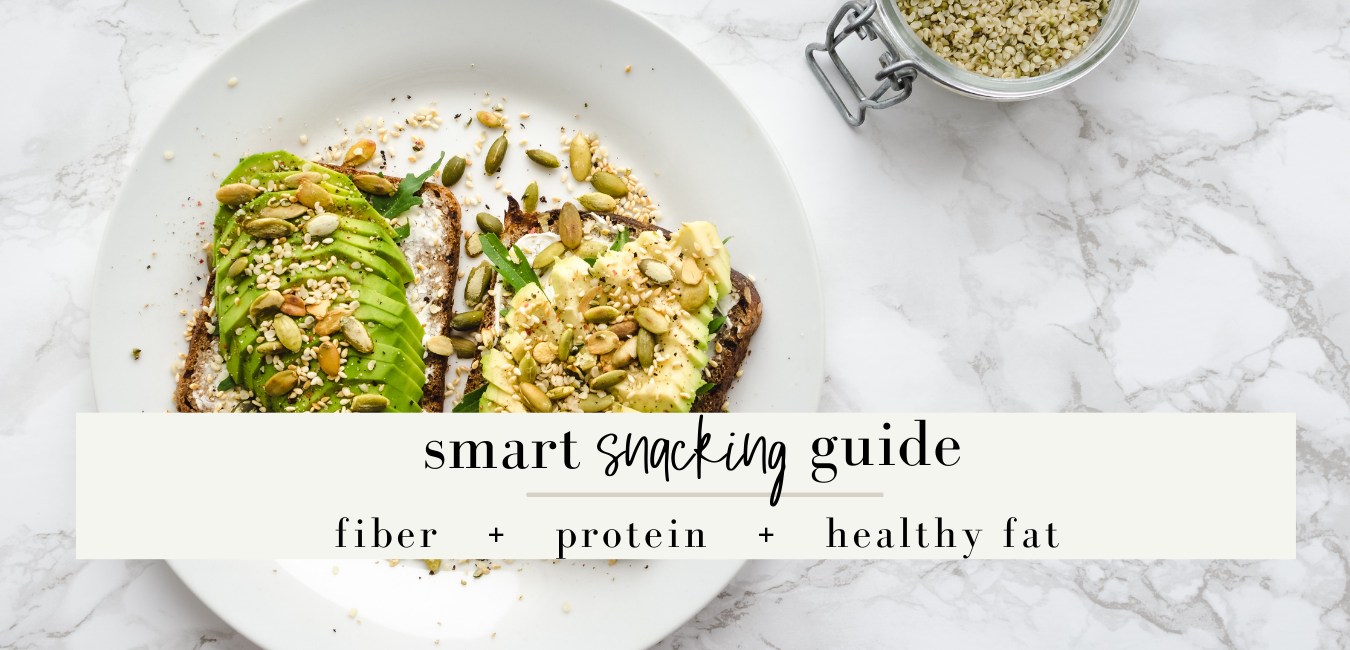
Creating healthy and balanced snacks will help you feel full, stabilize your blood sugar levels, all while offering nutrients your body needs. Having some snacks planned and on hand will help when meal plans run late or you find yourself starving and need something quick.
Check out some great ideas in our 25 Fast and Filling Mediterranean Diet Snacks post.
#11 Set Yourself Up for Success
Change is extremely hard and life throws us many curveballs. Nothing worth having comes easy. There are a few things you can do to set yourself up for success when it comes to the Mediterranean Diet.
- encourage your family or a friend to start with you
- write down short term and long term, attainable goals. Include a plan for reaching your goal
- stock your pantry with Mediterranean diet staples like canned beans, frozen fruits and veggies, whole grains, olive oil, canned tuna, etc
- meal plan for the week. Check out our Meal Planning Guide for tips on creating weekly menus
- spend a little time meal prepping. It doesn’t have to take hours. Check our Meal Prep Based on Time for tips on what you can pull together in as little as 15 minutes
- plan a few snacks you can have on hand when you need something fast
- remember that small steps lead to big changes and don’t expect to everything to change overnight.

